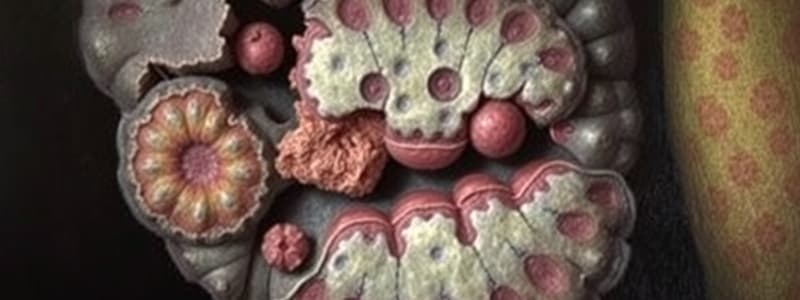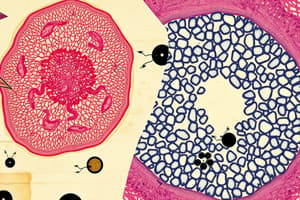Podcast
Questions and Answers
What are tissues?
What are tissues?
Groups of cells similar in structure that perform a common or related function.
Which of the following are primary tissue types? (Select all that apply)
Which of the following are primary tissue types? (Select all that apply)
- Cartilage
- Muscle (correct)
- Connective (correct)
- Epithelial (correct)
- Nervous (correct)
All body cells operate independently.
All body cells operate independently.
False (B)
What is the function of epithelial tissue?
What is the function of epithelial tissue?
What does nervous tissue control?
What does nervous tissue control?
How are tissues organized in the body?
How are tissues organized in the body?
What is histology?
What is histology?
What type of tissue contracts to cause movement?
What type of tissue contracts to cause movement?
Flashcards are hidden until you start studying
Study Notes
Tissue Overview
- Tissues consist of groups of similar cells that perform common or related functions.
- Four primary tissue types: epithelial, connective, muscle, and nervous tissue.
- Epithelial tissue functions to cover surfaces, connective tissue provides support, muscle tissue enables movement, and nervous tissue controls functions.
- Tissue organization forms the structural foundation for organs in the body.
Single-cell vs. Multicellular Organisms
- Unicellular organisms operate independently, while multicellular organisms rely on cell cooperation.
- Each multicellular cell type specializes to maintain homeostasis and benefit overall body function.
- Specialized cells enable complex body functions and can be distinguished based on their roles and appearances.
Tissue Function and Specialization
- Muscle cells, skin cells, and brain cells exhibit distinct characteristics and functions.
- Injury or loss of specialized cells can adversely affect organ function and overall body capabilities.
Organ Structure and Physiology
- Organs are composed of multiple tissue types, typically including all four primary tissue types.
- The arrangement of these tissues dictates the organ's structure and function.
- Histology (the study of tissues) pairs with gross anatomy to enhance understanding of organ physiology.
Muscle Tissue Types
- Skeletal muscle: Attached to bones, enables voluntary movement.
- Cardiac muscle: Found in the heart, responsible for involuntary heart contractions.
- Smooth muscle: Present in the walls of hollow organs, also functions involuntarily.
Epithelial Tissue Functions
- Creates boundaries between different environments, providing protection.
- Involved in secretion, absorption, and filtration processes.
Studying That Suits You
Use AI to generate personalized quizzes and flashcards to suit your learning preferences.




